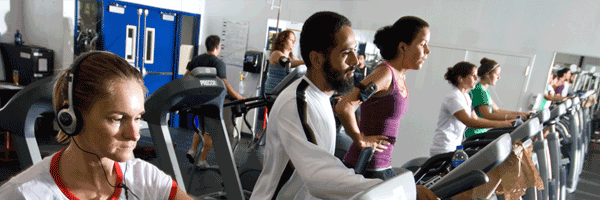Getting started on a fitness program and think the first thing that you should be doing is getting your cardio program in gear? For many people, the primary form of exercise they choose to do when they hit the gym is cardiovascular training, but this may be a huge mistake.
We’ve been conditioned to believe that cardio is a great place to start and if you happen to have the goal of fat loss, that it’s the primary form of exercise that you must be doing.
But, is this belief really accurate? The fact of the matter is that cardio – especially performed too often, can do more harm than good.
In this article, we will outline the biggest problems that arise when we perform too much cardiovascular exercise, so that you can see for yourself why it may actually be hindering your progress.
Increased Inflammation
The very first problem you may encounter with too much cardiovascular exercise is the fact that it will cause a cascade of reactions in the body that will then increase the total level of body inflammation.
You’ll notice that you start to look puffy and swollen in your legs and sometimes even midsection and you may start to feel generally achy all over.
The body is trying to keep up with these high levels of exercise being placed upon it and all the stress that goes along with it, but in many cases, the excessive cardio is just too much to be overcome.
The bottom line: If you don’t give your body enough time to recover from your last training session, levels of inflammation may continue to increase until a chronic state is achieved.
Lean Tissue Loss
 The next issue that’s associated with too much cardio training is that you will be at a greater risk of lean muscle tissue loss. This problem will only be amplified if you are also using a lower calorie diet in order to lose fat while also neglecting strength training.
The next issue that’s associated with too much cardio training is that you will be at a greater risk of lean muscle tissue loss. This problem will only be amplified if you are also using a lower calorie diet in order to lose fat while also neglecting strength training.
If you’re a cardio bunny eating rabbit food all day, you won’t be seeing the positive changes to your body composition that you’re hoping for.
The bottom line: Excessive aerobic training promotes muscle loss which has a negative impact on your health.
Impaired Recovery
If you’re doing hours and hours of cardio each week and you are smart enough to also be attempting a strength training workout to go along with it, you’ll have another issue on your hands – impaired recovery ability.
Basically, your body will be trying relentlessly to keep up with all the exercise stress being placed on your muscles, joints, tissues, and central nervous system.
But, when too much exercise is occurring, it’s just too much to take. Recovery for the workouts that really make a difference – strength training – will go down and this means you’ll see fewer results from those workout sessions.
The bottom line: Excessive cardio, even at lower intensity levels can be extremely detrimental for your recovery capacity.
Increased Hunger
For many people, after they finish up one of their hour-long cardio sessions on the bike, treadmill, or elliptical, they want one thing: FOOD!
Cardio has a tendency to make many people hungrier while they’re on a diet than if they didn’t do the cardio training, so this can make it very trying to sustain that reduced calorie intake.
Along with this, you’ll notice that you feel more binge-like as you diet, which clearly is not going to be a good situation any way you look at it.
While for some people the more intense forms of cardio won’t create these issues, almost all steady state cardio, when done to high enough extents, will create this problem to occur.
The bottom line: Sticking with your diet is the most critical thing you must do to see weight loss success, so if your cardio training is hindering that, you have a serious problem on your hands.
Weakened Immune System
When your body becomes run down, it’s ability to fight infection decreases dramatically. Not only will you get sick more often, but the symptoms you experience will be more severe.
From Dr. Chris Kresser:
“Research has shown that the cellular damage that occurs during overtraining can lead to nonspecific, general activation of the immune system, including changes in natural killer cell activity and the increased activation of peripheral blood lymphocytes. This hyperactivity of the immune system following intense overtraining can possibly even contribute to the development of autoimmune conditions.”
The bottom line: If your body is constantly channeling all of it’s energy to repair your body from exercise, it will have little left for the immune system when an infection strikes.
Overuse Injuries
Finally, the last issue that excessive cardio is going to present is the fact that it’ll put you at risk for overuse injuries. Any time you’re doing a repetitive movement over and over again, there will always be that chance that you’ll suffer strain, stress, fractures, muscle tears, and so on.
for overuse injuries. Any time you’re doing a repetitive movement over and over again, there will always be that chance that you’ll suffer strain, stress, fractures, muscle tears, and so on.
Joint pain is often the most common overuse injury experienced, but there are a number of others that can go along with too much cardio. It’s not uncommon for long distance runners to get stress fractures in their femur when training for a race.
The bottom line: Too much of the same movement will put your joints, bones, and connective tissue at increased risk for physical injury.
How Much Cardio is Too Much?
The amount of cardiovascular exercise your body can handle depends on a number of factors including current stress levels, diet, genetics, amount and quality of sleep etc. Simply put, some people will be able to tolerate much more exercise than others.
Here is a list of some of the symptoms to look out for:
- Muscle loss
- Getting sick often
- Sleep problems
- Feeling tired, rundown, and irritable
- Gaining body fat or not losing body fat despite exercise
- Chronic muscle and joint soreness
If you are experiencing any of the above symptoms, it’s possible that you are in a chronic state of overtraining and should take some time off to evaluate and modify your exercise program.
Putting it All Together
Excessive cardiovascular training can be detrimental to your health and make it nearly impossible to reach your fitness goals. Balance between diet, resistance training, and aerobic exercise is the key to a optimal health, regardless of your specific goals.
Listen carefully to your body, and if you are experiencing any symptoms of overtraining don’t hesitate to take time off to allow your body to heal.
Tell us about your experiences with cardiovascular training. Have you ever been in a state of overtraining? What do you do to maintain balance in your exercise routine?

